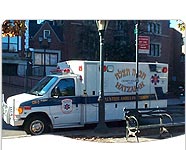 
Concussions by Alton Thygerson
A blow or jolt to the head can disrupt the normal function of the brain. Physicians often call this type of brain injury a concussion. There is no universal agreement on the exact definition of a concussion. Physicians may describe these injuries as mild because concussions are usually not life threatening. Even so, the effects of a concussion can become serious. A concussion may cause a loss of consciousness or even affect the ability to breathe for a short time period of time.
How Prevalent are Concussions?
The Centers for Disease Control and Prevention (CDC) estimates 300,000 sports-related concussions occur per year (100,000 in football alone). No data on nonsports-related concussions is available. Concussions can occur in two ways: the head strikes against an object (e.g., falling) or a moving object strikes the head (e.g., hit by a baseball bat). Car crashes and falls may be the main causes of nonsports-related concussions.
What Happens to the Brain?
The brain is a jello-like substance vulnerable to outside trauma. The skull protects the brain against trauma, but does not absorb impact forces. During a concussion the brain rotates and twists inside the skull, causing damage to brain tissue.
Signs of a Concussion
Because the brain is very complex, every brain injury is different. Some symptoms may appear right away, while others may not show up for days after the concussion.
The American Academy of Neurology (AAN) has a list of the signs of concussions. Immediate signs of concussion occur within seconds to minutes after a concussion:
- Impaired attention--vacant stare, delayed responses, inability to focus
- Slurred or incoherent speech
- Disorientation
- Emotional reactions out of proportion
- Memory deficits
- Any loss of consciousness
Later signs of concussion occur within hours to days. Signs include:
- Persistent headache
- Dizziness/vertigo
- Poor attention and concentration
- Memory dysfunction
- Nausea or vomiting
- Fatigue easily
- Irritability
- Intolerance of bright lights
- Intolerance of loud noises
- Anxiety and/or depression
- Sleep disturbances
Generally, recovery is slower in older persons. Also, persons who have had a concussion in the past may find that it takes longer to recover from their injury. People with a concussion need to be seen by a physician. The care for concussion is rest. A headache is usually treated with an over-the-counter pain medication (e.g., aspirin, acetamenophen, ibuprofen).
Most people get better after a concussion without any permanent damage. Lingering symptoms and continuing cognitive problems following a concussion may occur for weeks or months after a concussion.
Repeated concussions could cause permanent damage. If a second concussion occurs while the victim is still healing from a previous concussion, the victim is more likely to experience brain swelling and other widespread brain damage. It can also be fatal.
Concussions can be prevented by:
- Wearing a safety belt whenever driving or riding in a motor vehicle
- Wearing a helmet while playing collision sports
- Wearing a helmet while riding a bicycle or motorcycle
The above is for general informational purposes only. Always consult your
physician regarding specific medical issues and call Hatzalah or your local
ambulance service in the event of an emergency.
Back to Digest Index
|









